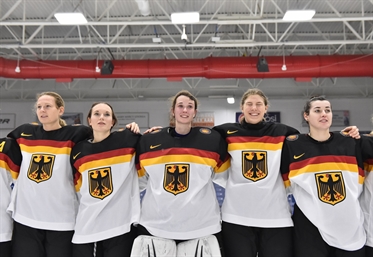Germany’s rejuvenation
Germany’s rejuvenation
Coach Hinterstocker has made a difference

 PLYMOUTH, MICHIGAN - April 1: Team Germany sing during their national anthem after defeating Czech Republic 2-1 during preliminary round action at the 2017 IIHF Ice Hockey Women's World Championship. (Photo by Minas Panagiotakis/HHOF-IIHF Images)
PLYMOUTH, MICHIGAN - April 1: Team Germany sing during their national anthem after defeating Czech Republic 2-1 during preliminary round action at the 2017 IIHF Ice Hockey Women's World Championship. (Photo by Minas Panagiotakis/HHOF-IIHF Images)
Every team except the senior men’s was demoted or playing Division I in one horrible year (2014-15), but quickly the nation is getting back to the top pool and reasserting itself.
This is most evident with the women’s national team, which earned promotion last year and is now, improbably, 2-0 and on its way to the quarter-finals at the 2017 Women's Worlds in Plymouth. A large part of that rejuvenation is thanks to coach Benjamin Hinterstocker and his strategy, which, out of necessity, is different from anything the North Americans would put forward.
“You cannot compare the United States and Canada to Germany because we don’t have that many female players,” the 37-year-old Hinterstocker explained after yesterday’s stunning 2-1 win over the Czech Republic. “As a result, we made the decision after Sochi to take all the 96-born girls out of the under-18 program and put them in the women’s program. Three years later, we can say we made the right decision. They needed those years to play games. They have 60 national games to their credit now.”
Germany finished a disappointing seventh at the 2014 Olympics, and it was soon after that that Hinterstocker was named head coach of the U18 team for a year befor becoming head coach of the senior team. He had been an assistant since 2009, and now it seems both he and the team are coming into their own at the same time. “I’ve been with the team almost three years now. Sometimes it takes less time or more time, but I think now after three years we’re playing the way we knew we could.”
In his first year as head coach, 2015, the team was demoted to Division I, but last year it earned promotion. In early February, however, it suffered a major blow, losing to Japan, 3-1 in Tomakomai, and failing to qualify for the 2018 Olympics in PyeongChang. To come here and beat Sweden and the Czechs gives the players a much-needed confidence boost.
“We want to win every time we play,” Hinterstocker said. “The same for a few weeks ago in Japan, and right now we’ve played two games and have two wins. We played Sweden during the season twice, and then an exhibition against them, so we knew them when we played them. The Czechs are a strong skating and hard-working team, but you can’t predict. Right now, we have two games and six points, so we’re happy.”
Hinterstocker’s career was typical. Born in 1979 in Berlin, his father was Martin Hinterstocker, a longtime and well-respected player. He and his brother, Martin, Jr., played hockey as kids, and Benjamin played in two World Junior Championships, in 1997 and ’98. Both boys went on to play professionally. Benjamin played in the German league for a decade, retiring in 2007.
A year later, “the women’s team was looking for an assistant coach, and I was interested,” he explained. “It’s a huge challenge. It’s so different from men’s hockey, but at the same time you play five-on-five with a puck, so it’s not so different in some ways.”
Benjamin got his first chance as a head coach in 2014 with the under-18 team in Division I, but the goal all along was to have him up with the senior team. “It’s part of my life now, and I feel really comfortable in this situation,” he said. “I think we have to break the barrier between saying it’s men’s hockey or it’s women’s hockey. We should think bigger. It’s all just hockey.”
But for Germany right now, it’s not just hockey—it’s playoff hockey! And maybe, just maybe, the underdogs, newly-promoted, can put a scare into the other teams as the tournament moves along this week.
Back to Overview














































